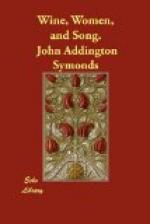“Soldier brave, my love!”
she said,
“Where is
now my Paris?
Fights he in the field, or
where
In the wide word
tarries?
Oh, the soldier’s life,
I swear,
All life’s
glory carries;
Only valour clothed in arms
With Dame Venus
marries!”
Phyllis thus opens the question whether a soldier or a scholar be the fitter for love. Flora responds, and for some time they conduct the dispute in true scholastic fashion. Being unable to settle it between themselves, they resolve to seek out Love himself, and to refer the matter to his judgment. One girl mounts a mule, the other a horse; and these are no ordinary animals, for Neptune reared one beast as a present to Venus, Vulcan forged the metal-work of bit and saddle, Minerva embroidered the trappings, and so forth. After a short journey they reach the Garden of Love, which is described with a truly luxuriant wealth of imagery. It resembles some of the earlier Renaissance pictures, especially one of great excellence by a German artist which I once saw in a dealer’s shop at Venice, and which ought now to grace a public gallery.
FLORA AND PHYLLIS.
PART III.
No. 29.
On their steeds the ladies
ride,
Two fair girls
and slender;
Modest are their eyes and
mild,
And their cheeks
are tender.
Thus young lilies break the
sheath,
Budding roses
render
Blushes, and twinned pairs
of stars
Climb the heavens
with splendour.
Toward Love’s Paradise
they fare,
Such, I ween,
their will is;
While the strife between the
pair
Turns their cheeks
to lilies;
Phyllis Flora flouts, and
fair
Flora flouteth
Phyllis;
Flora’s hand a hawk
doth bear,
And a goshawk
Phyllis.
After a short space they came
Where a grove
was growing;
At the entrance of the same
Rills with murmur
flowing;
There the wind with myrrh
and spice
Redolent was blowing,
Sounds of timbrel, harp, and
lyre
Through the branches
going.
All the music man could make
There they heard
in plenty;
Timbrel, psaltery, lyre, and
lute,
Harp and viol
dainty;
Voices that in part-song meet
Choiring forte,
lente;
Sounds the diatesseron,
Sounds the diapente.
All the tongues of all the
birds
With full cry
were singing;
There the blackbird’s
melody
Sweet and true
was ringing;
Wood-dove, lark, and thrush
on high
Jocund anthems
flinging,
With the nightingale, who
still
To her grief was
clinging.




